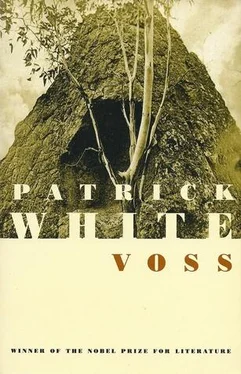‘Who am I? Who am I, then?’ she would ask, tickling the child’s stomach, while looking over her shoulder to make certain that nobody had seen or heard. ‘I am your Gran. Your Grand -mother.’
The child knew.
So Mrs Bonner was appeased.
In the first stages of her illness Laura Trevelyan had seemed to forget Mercy, but on the night when they cut off her hair, she roused herself, and said:
‘I would like to see her.’
‘Whom?’ they asked.
‘My little girl.’
‘But it would not he wise, dear,’ said the aunt, ‘on account of the possibility of infection. Dr Kilwinning would bear me out.’
The sick woman was thinking of something. Her face was giving it painful shape.
‘But if it were to be for the last time?’ she asked.
‘That is morbid talk,’ said Aunt Emmy, ‘when Dr Kilwinning is so particularly pleased with your progress.’
Then Laura Trevelyan began to laugh, except that she could not bring it out.
‘Oh, I shall not die,’ she did just manage. ‘Or you will not bury me.’
‘Laura, Laura!’ cried the aunt, horrified by the suffocated words that had struggled out of the scorched lips.
‘Because, you see, I am the only survivor of you all.’
‘Will you take a little cold broth if I bring it?’ asked Mrs Bonner, in self-defence.
Although her niece did not reply, she brought the soup, and was less troubled than usual when it was refused, as if the drinking of it had been but of secondary importance.
Presently Laura said:
‘Let us return to the subject of Mercy. Do you remember those people, those Asbolds?’
‘Only now that you have reminded me,’ Aunt Emmy said, but coughed a little wheezy cough.
Laura was silent again for quite an appreciable space, until Mrs Bonner began to suspect the presence of some terrible danger. There was, moreover, a heavy, cloying smell that had begun to irritate and worry her, inasmuch as she was unable to trace its origin. Her niece’s silence and the musty smell did fill the room with foreboding.
Laura opened her eyes. The aunt had never seen them so fine, nor so revealing. It was just for this reason that Mrs Bonner would not allow herself to look at them. She began to arrange the hairbrushes.
‘If I were to make some big sacrifice,’ Laura was saying. ‘I cannot enough , that is obvious, but something of a personal nature that will convince a wavering mind. If it is only human sacrifice that will convince man that he is not God.’
She began to cough. Mrs Bonner was frightened.
‘Oh, dear, it is my throat. It is the terrible Sun that he is imitating. That is what I must believe. It is a play. For anything else would be blasphemy.’
When her aunt had held water to her lips, again Laura opened her eyes very wide in her molten head.
She said:
‘So we must make this sacrifice, if necessary, over and over, till we are raw and bleeding. When can she go?’
‘Who?’
Mrs Bonner trembled.
‘Mercy.’
Laura Trevelyan moistened her lips.
‘To the Asbolds, as we have arranged. She is such a kind woman. She has such cool cheeks. And plum trees, were they? You see, I am willing to give up so much to prove that human truths are also divine. This is the true meaning of Christ. As Mrs Asbold will tell you. Won’t she? It is the secret we have had between us, all this time, since she would not look at me, and I saw that it was only a question of who should make the sacrifice.’
Mrs Bonner was distraught.
‘When will she go?’ Laura asked.
‘We shall talk about it some other time,’ gasped Mrs Bonner.
‘Tomorrow at the latest,’ Laura replied. ‘I shall make a point of gathering all my strength, all the night.’
‘Yes, yes. Rest.’
‘So that I shall be strong enough.’
Mrs Bonner was almost suffocated by unhappiness and the mysterious smell.
Laura appeared to be sleeping. Only once she opened her eyes, and in a voice of great agony, cried out:
‘Oh, my darling little girl.’
When, later, Mr Bonner came into the room, he found his wife in a state of some agitation.
‘Such a scene!’ Mrs Bonner whispered. ‘She has decided, for some reason, that she ought to give up Mercy, as a kind of sacrifice, to send her to the Asbolds after all.’
‘Then would it not be best to act upon her wishes?’ suggested the unhappy merchant. ‘Particularly as they coincide with your own.’
‘Oh, but she is out of her wits at present,’ said Mrs Bonner. ‘It would not be right.’
Mr Bonner seldom attempted to unravel the moral principles of his wife.
‘Besides,’ she added.
But she did not elaborate. On the contrary, she assumed an expression of cunning, to mask that secret life which she had begun to share with Laura’s child.
Mr Bonner would have been content to preserve the silence.
‘Oh, but there is a most intolerable smell! Do you not smell it?’ the good woman burst out.
‘Yes,’ said Mr Bonner. ‘I expect it is the pears.’
‘Which pears?’
‘The pears that I brought home for Laura, oh, on that night, the first night of her illness, and put down. Yes, here they are, my dear. In the confusion they have escaped your notice.’
‘ My notice!’ cried Mrs Bonner.
There, indeed, were the black pears, somewhat viscid, in their nest of withered leaves.
‘Disgusting! Do, please, remove them, Mr Bonner.’
He was quite relieved to do so, this powerful man who had lost his power.
When she had dispatched the odious pears, and was alone except for her sleeping niece, Mrs Bonner was the better disposed for thought. I will think, she used to say, but in all her life had never discovered the secret of that process. It was a source of great exasperation to her, although most people did not guess.
Now, all night she was ready in fits of waking to welcome thought, which did not come. Then I am an empty thing, she admitted helplessly. Yet, she had been pretty as a girl.
By ashy morning, all joy or consolation seemed to have left the old woman, except their child, who was to go too.
So she rose quickly when the sun was up, and bundling the rich sleeves back along her arms, blundered into that room where Mercy had woken in a sound of doves.
‘There,’ said the woman. ‘We are together now.’
The child seemed to agree. How she fitted herself to the body. Beyond the window, all was now a drooling and consolation of doves. In the sunrise which was flooding the cool garden Mrs Bonner forgot those incidents of the past that she chose to forget, and was holding the flesh of the child against the present. All dark and dreadful things, all that she herself could not understand, might be waved away, if she could but keep the child.
‘How you do dribble,’ she said, almost with approval. ‘Dirty little thing!’
So she would address her secret child.
And Mercy clearly saw through the crumpled skin to those greater blemishes, which, in her presence, there was no necessity to hide.
That morning, when she was again decently concealed beneath a clean cap, Mrs Bonner went in to her niece, and was very brisk.
‘I declare you have slept beautifully, Laura,’ she said, arranging the pillows with her competent hands.
Laura did not contradict, but let things happen, for innerly she was inviolable.
And soon her aunt was trembling.
‘Will you not let me brush your hair?’ she asked.
‘But I have none,’ Laura replied.
Sometimes Mrs Bonner developed palpitations, which she would admit to her husband when it suited. Now, however, she realized that he had already left; the morning was hers, to arrange as she wished.
Laura turned her eyes, in that face which there was no escaping since the hair was cut, and said:
Читать дальше












